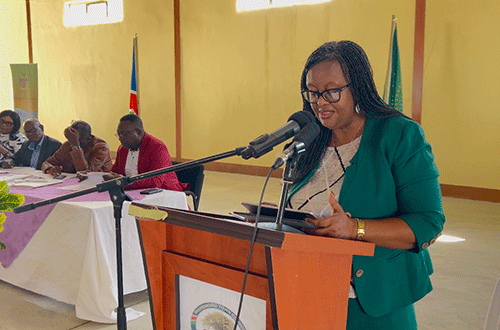The two Kavango regions have immense potential to contribute to solving Namibia’s economic problems because they boast fertile land, a great supply of water, favourable climate conditions and abundant natural resources.
This was the view of Bank of Namibia governor Johannes !Gawaxab, who said “the Kavango East and Kavango West regions have the highest agricultural potential, which can significantly contribute to food security and diverse exports”.
He was speaking at public lectures held this week in both regions, aimed to provide a basic understanding of current economic shocks, their origins, and how Namibia as a small, open economy can insulate itself from mounting externally-driven shocks and pressures.
The governor emphasised that policy actions for inclusive economic growth to assist the country in navigating these turbulent times, are needed.
“As the country reels from yet another external shock, we should aim to identify solutions that drive economic recovery and development by building a resilient economy and capitalising on digitisation,” he noted.
According to him, inflation acts as an additional tax on the poor and vulnerable. Therefore, it is critical for national level actions to support these groups specifically, particularly by strengthening social protection programmes in the short-term.
The incidences of multi-dimensional poverty were highest in Kavango West (79.6%) and Kavango East (70%), according to the Namibia Statistics Agency (NSA)’s Multi-dimensional Poverty Index (MPI) Report 2021.
In June 2022, the annual inflation rate increased by 6%, compared to 4.1% recorded in June 2021. The NSA stated that transport and food and non-alcoholic beverages’ components continued to be the main contributors to the annual inflation rate with a contribution of 2.7 percentage points and 1.3 percentage points, respectively.
The governor further presented opportunities from import substitution, adding that the list of Namibia’s import bill shows that 15 products which are currently imported in significant quantities can be substituted with domestically-produced goods or scaled up as some are already produced locally as well.
In total, the import bill of these 15 products translated to N$5 billion in 2021. “If we substitute these imports or a significant portion thereof by producing them cost-effectively here at home, it will have a massive impact, with added multiplier benefits: opportunities for self-employment and small and medium enterprises (SMEs),” stated !Gawaxab.
The products include some food, chemicals, plastic and rubber as well as other goods.
On policy options, Namibia needs to implement the reforms resolutely to attract the needed investments and encourage private sector participation, investing in new engines of growth, while improving the old ones like health, technology, skills and education.
“We need to ensure food and energy security (including clean energy), encourage start-ups and self-employment in all sectors, substitute our imports and improve value-addition. We need to maintain macroeconomic stability, including restoring fiscal sustainability and stable prices and financial systems,” he advised.


